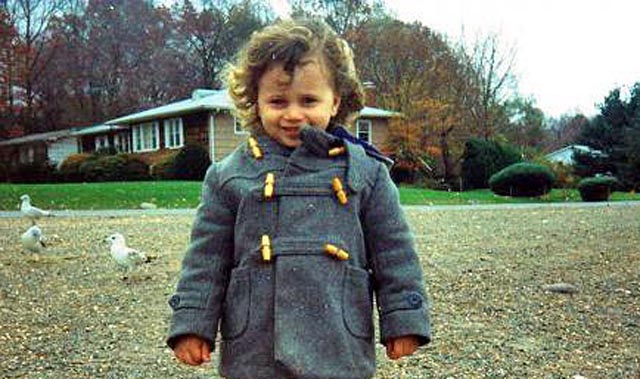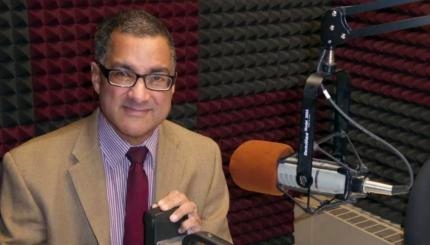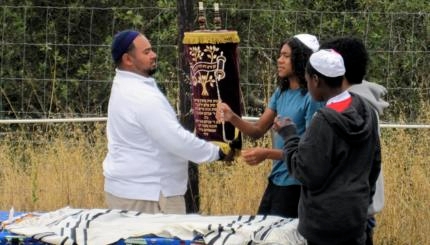They were older than me, by at least five years, and I was afraid. Though my Satmar Hasidic neighbors were my friends, their cousins usually approached me with disdain whenever I’d go over for a playdate. On one occasion, they bullied me and lifted my shirt up. He asked “where are your tzitzis?” feeling uncomfortable I stammered, they said “you call yourself a yid!? Gai ahein you goy!” I tripped as I begged my feet to carry me towards the door, but then it got worse, they poured cold water on me, and repeated the abusive slurs. I walked home crying to never tell a soul until over a decade later. –How?!
I learned, from a very young age, how complicated modern Jews and Judaism are. I grew up in a mixed-race Chabad-Lubavitch family in Monsey, New York, where I was exposed to all walks of Orthodox Jewish life. My mother, a convert into the Orthodox community, my father a “Ba’al Teshuva” someone who sees themselves as a returnee to higher levels of spiritual consciousness and Jewish practice, made a point to educate us on our rich Jewish and African history, and always encouraged us to be Dorshei Chochmah, those who see the deep wisdom, Chochmah, the diverse wisdom, found in our world.
To this day, I wonder how could society have produced teenagers who saw it as their right to put me down for how I looked or dressed? Was this race related, though I pass for white? Was this due to the homogeneous reality of my ZIP code? Maybe it is because my family background challenged the assumptions of what a Jew looks like…I don’t have answers.
What I do know is that they were not what Rabbi Sid Schwarz would call “seekers of wisdom (dorshei chochmah), seekers of social justice (dorshei tzedek), seekers of community (dorshei kehillah), and seekers of lives of sacred purpose (dorshei kedushah).” On a good day, I see my neighbor’s cousin’s as those who were a product of a society that did not see me in my Jewishness, and because of their upbringing, it would be hard for them to see my Jewishness and my family history as a form of wisdom worth exploring.
My parents, my heroes of meaning, purpose, and justice, raised us with eyes toward the Divine in all and that there is a Divine wisdom that fills all peoples. They taught us, they guided us, with the mission of bringing redemption, not just to the Jewish world, but the world as a whole. They saw this not as a fanciful and nice idea, but as our integral mission as Jews.
They raised us this way knowing full well the prophet’s words “days are coming when there will be a hunger in the world, but not for bread or water and to hear the words of the Living God,” and they did so knowing that redemption would come through the multitude of wisdoms of the world, as their marriage represented to some extent.
I went to a haredi (ultra-Orthodox) yeshiva as a youth, and I enjoyed celebrating civil holidays with my deeply spiritual and deeply religious non-Jewish uncles and cousins. I sang the Alter Rebbe’s Niggun (song) while chanting the freedom songs that celebrate my existence — my mother cried a thousand tears from the TV room of our Monsey home when Barack Obama was inaugurated as the first Black president in American history.
My childhood home was a representation of what a 21st century Judaism should look like. Our home was a haven for many of my peers when looking for a place to be themselves. My father would hang out with what we coined as the “Monsey rebels,” and teach us from his heart and from his mind the lessons of Judaism, with his encyclopedic memory would offer us kernels of Torah and how it related to the spheres of science and literature. My mother would do the same with her deep love for the Jewish nation and Jewish peoplehood, driving the mission of Sinai forward all through the rhetoric of a freedom fighter and woman of color.
My vision as a Jew of color, as a rabbi, as a member of the millennial generation, and as a social activist who seeks to create visibility for those who are unseen, is to create platforms for our collective wisdom as Jews could be heard, because for too long, their wisdom has been silenced. This is my vision for our Jewish future as an individual, and this is the vision of our Beis Community: an innovative creative Jewish community.
We are building a Judaism that sees everybody with their own wisdom, where nobody is left out, and where everyone’s voice of wisdom could be heard. Where people can hear their voice and smile because they know that who they are is enough and how they practice is enough to be supported and sheltered in Abraham’s tent. To quote Rabbi Schwarz once again, “the future vibrancy of the Jewish community depends on leaders of the Jewish community reaching out to this constituency and finding ways to reach them, even as it will challenge many long-standing assumptions of what the Jewish community should look like.”
haredi
Pronounced: hah-RAY-dee, Origin: Hebrew, literally “in awe of” or “fearing” God, this means ultra-Orthodox or fervently Orthodox.
Torah
Pronunced: TORE-uh, Origin: Hebrew, the Five Books of Moses.
yeshiva
Pronounced: yuh-SHEE-vuh or yeh-shee-VAH, Origin: Hebrew, a traditional religious school, where students mainly study Jewish texts.




